To accompany your Come Follow Me study for January 24-30
In addition to reading Moses 7, you may also want to:
- Read “Translated Beings” at https://www.churchofjesuschrist.org/study/scriptures/gs/translated-beings?lang=eng
- Read “Zion” at https://www.churchofjesuschrist.org/study/scriptures/gs/zion?lang=eng
- Read “Moses 7:1-41” in the Pearl of Great Price Institute Student Manual at https://www.churchofjesuschrist.org/study/manual/the-pearl-of-great-price-student-manual-2018/the-book-of-moses/moses-7-1-41?lang=eng
- Read “Moses 7:42-69” in the Pearl of Great Price Institute Student Manual at https://www.churchofjesuschrist.org/study/manual/the-pearl-of-great-price-student-manual-2018/the-book-of-moses/moses-7-42-69?lang=eng
- Look at the related study aids from Book of Mormon Central at https://bookofmormoncentral.org/come-follow-me/old-testament/come-follow-me-2022-moses-7
- See the video Come Follow Me LDS 2022 (Jan 24-30) Moses 7 | The Megavision at https://www.youtube.com/watch?v=c4BNXjbAzqA&t=1s
If you would like a Kahoot game related to this material which you could use for personal study or use with your family or your class, click here: https://create.kahoot.it/share/moses-7/cf9628cb-a2b4-4ca3-838c-f8dde82e116e
Points to Ponder in Moses 7
1. How do you reconcile 7:4, which tells of Enoch’s vision of God, with Ether 3:15, which seems to tell the brother of Jared than no one else had seen God up to that point?
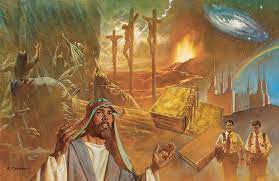
2. What do we do with Moses 7:22, which tells us that the seed of Cain were black and had no place among the people of God?
3. What impresses you most about the way the Lord protected Enoch in battle? (7:13-17) To what extent do you expect parallel experiences to occur in the latter-day Zion?
4. Does 7:28 mean Enoch thought rain was caused by the tears of God?

5. Enoch believed that the Lord had created at least how many other earths like ours? What does modern astronomy have to say about that possibility? What does this teach us?

6. Is it true this earth is number 1 in at least one aspect among all of God’s creations? (7:36.) What implications do you see in this revelation? Do you suppose the rankings could have changed since Enoch’s time?

7. What, from Moses 7, appears to be the likelihood that the earth’s inhabitants may continue to get better and better until the Son of God can return to a world prepared for and worthy of his presence?
8. What do you see in Moses 7 which should comfort Latter-day Saints from a temporal standpoint?
9. What special significance do you see in the Lord’s use of the words “we” and “our” in 7:63?
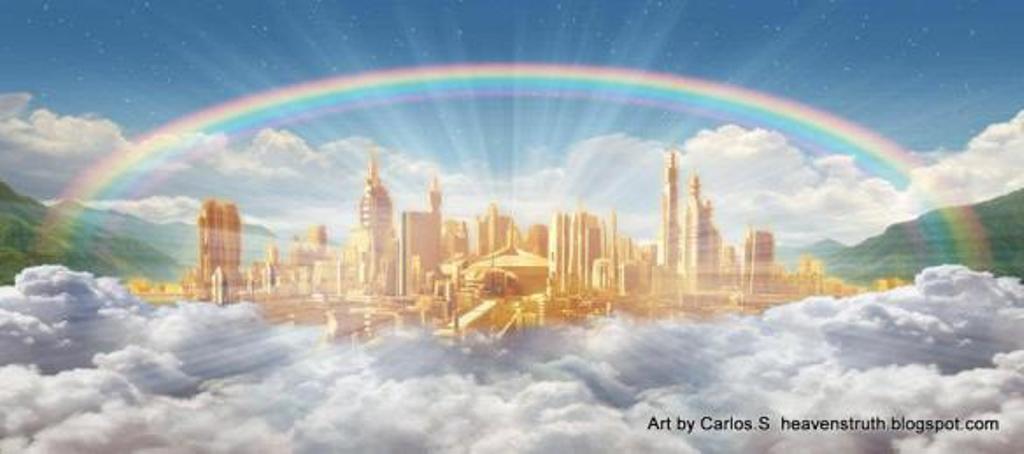
10. What do you consider the greatest passages in Moses 7 in terms of their practical application in your life?
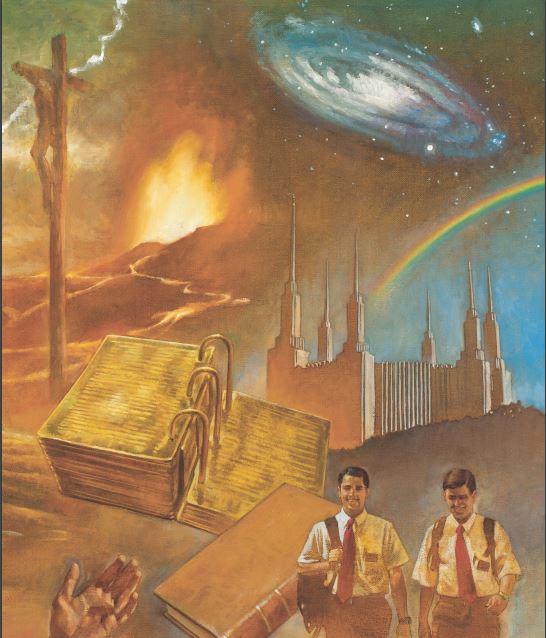
11. How would you respond to anyone who suggested that Satan seemed to be having more fun than God, as he was “laughing,” whereas God was weeping? (7:26-28)

12. Why do you suppose our Bible Dictionary gives no dates for any Old Testament events between the fall of Adam and the reign of king Saul, despite the fairly clear chronological data given in Genesis and reiterated in Moses?
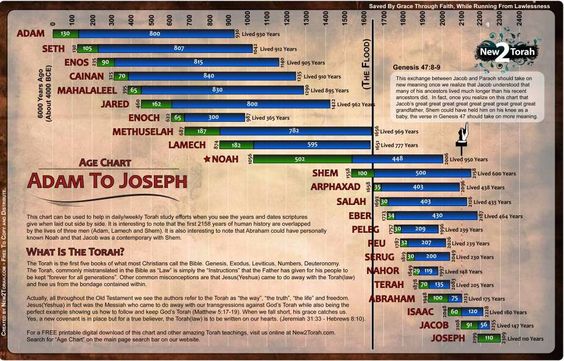
13. How early after Enoch began preaching did Zion get established?
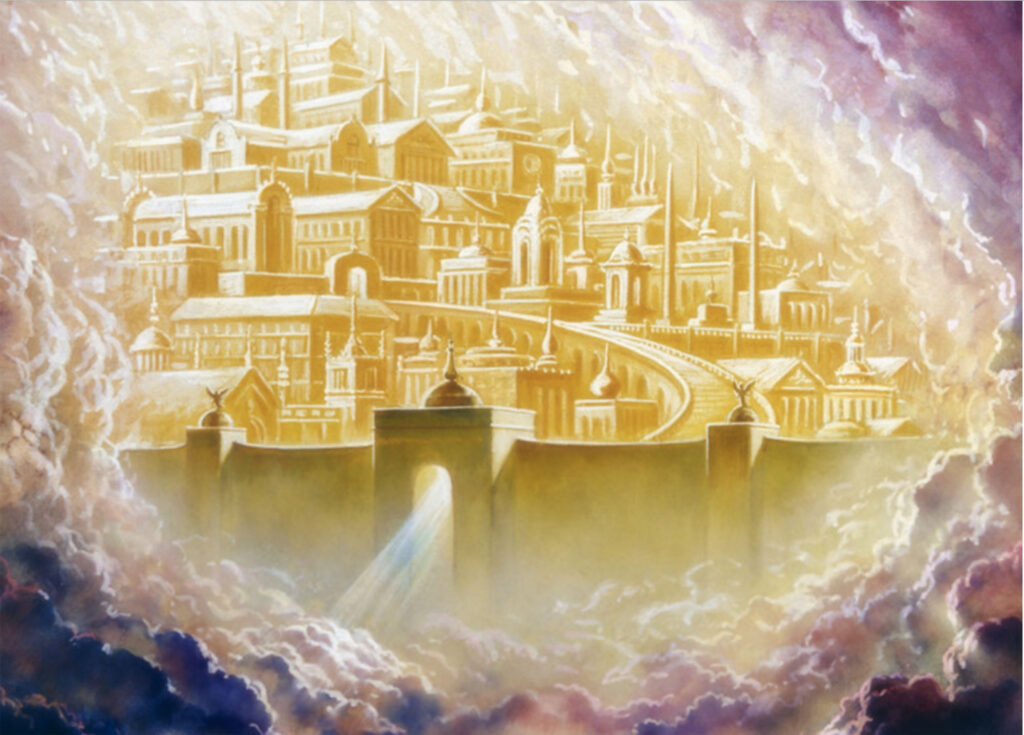
14. We often hear people say, “Nobody’s perfect. If we were, we wouldn’t be here” implying that if we could just become as good as Enoch’s people were, the Lord would translate us. What response could you give to such speculators, if they asked your opinion?

15. Who were the spirits “in prison” referred to in 7:57 who came forth and stood on the right hand of God when the Savior was resurrected? If they were that good, why had they been “in prison”? Who were the “remainder” who were reserved in chains of darkness until the judgment of the great day”? Weren’t they really the ones who were “in prison”?
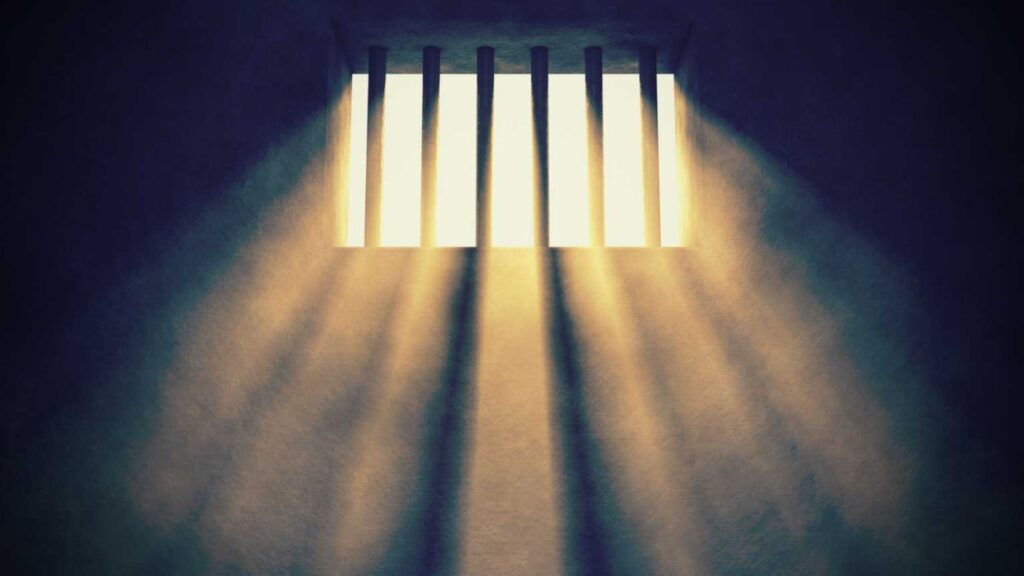
16. How many different names or titles for God the Father and/or Jesus Christ can you find in Moses 7? Which of those names or titles are found no where else in the scriptures? What is the significance of each?
Possible Answers to Points to Ponder in Moses 7
1. How do you reconcile 7:4, which tells of Enoch’s vision of God, with Ether 3:15, which seems to tell the brother of Jared than no one else had seen God up to that point?
Several explanations have been suggested. The most compelling to me is the idea that “man” is used in Ether 3:15 in the sense of carnal man, or uninspired man. It is not apparent that the vision of the brother of Jared was any greater than that of Enoch.
2. What do we do with Moses 7:22, which tells us that the seed of Cain were black and had no place among the people of God?
While it is not clear what is meant by “black” in this context, we do know that the alienation of Cain’s posterity from the people of God was their own choice, due to their refusal to accept the gospel, and was not from their being unjustly ostracized by the righteous due to their skin color, if in fact it was different from that of Enoch’s people. The cross reference given in both 7:22 and 7:8 is to 2 Nephi 26:33, which reminds us that God “denieth none come unto him, black and white, bond and free, male and female…and all are alike unto God.”
3. What impresses you most about the way the Lord protected Enoch in battle? (7:13-17) To what extent do you expect parallel experiences to occur in the latter-day Zion?
Your choice. I’m impressed that the Lord didn’t confine Himself to subtle measures but worked mighty and visible miracles with the movement of mountains, rivers, and lands rising out of the sea in protect Enoch. The Joseph Smith Translation version of Genesis 14:30-31 similarly promises:
“that every one being ordained after this order and calling should have power, by faith, to break mountains, to divide the seas, to dry up waters, to turn them out of their course;
“To put at defiance the armies of nations, to divide the earth, to break every band, to stand in the presence of God; to do all things according to his will, according to his command, subdue principalities and powers; and this by the will of the Son of God which was from before the foundation of the world.”
In this day of the restoration of all things, there is no reason to doubt that the Lord could use similar means to protect His people once again, should He choose to do so. D&C 45:66-71 promises protection to those in the latter-day Zion, though few details are given.
4. Does 7:28 mean Enoch thought rain was caused by the tears of God?
No. Enoch is just waxing poetic.
5. Enoch believed that the Lord had created at least how many other earths like ours? What does modern astronomy have to say about that possibility? What does this teach us?
Enoch said that if we could number the “particles” of millions of earths like ours, it would not be a beginning to the number of God’s creations. If we assume “particles” the size of a grain of sand, it has been estimated that it would take 1033 such particles to fill this earth. If we conservatively interpret Enoch’s “millions” as even two million, we would now be talking about 2x 1040 particles. However, astronomers estimate that there are only about 1 x 1023 stars in the entire universe. If each were assumed to have ten planets orbiting around it, that would give us still only 1 x 1024 spheres—far fewer than the “particles” of millions of earths like our own. Unless Enoch is simply mistaken or talking in hyperbole, it would appear from this that the universe is far larger than human science has thus far discovered!
6. Is it true this earth is number 1 in at least one aspect among all of God’s creations? (7:36.) What implications do you see in this revelation? Do you suppose the rankings could have changed since Enoch’s time?
Yes. But what a tragic category in which to place first! This, of course, would suggest that the righteous would want to be careful about adopting the behavior or beliefs or courting the approval of the average person on the most wicked of all planets. We have every reason to suspect that the rankings would be the same today. Joseph Smith in his day said his generation was as wicked as the generation that crucified Christ, and the Lord used the same language to describe latter-day wickedness that He employed to describe the wicked of Enoch’s day.
7. What, from Moses 7, appears to be the likelihood that the earth’s inhabitants may continue to get better and better until the Son of God can return to a world prepared for and worthy of his presence?
None. He will come in “days of wickedness and vengeance.” (7:60)
8. What do you see in Moses 7 which should comfort Latter-day Saints from a temporal standpoint?
Despite the wickedness of the latter days, the Lord promises to preserve His people. (V. 61) This preservation includes the building of a latter-day Zion, no doubt accompanied by the same power which accompanied Enoch’s people.
9. What special significance do you see in the Lord’s use of the words “we” and “our” in 7:63?
Not only Enoch and his people but the Lord himself will greet those of the latter-day Zion and associate with them.
10. What do you consider the greatest passages in Moses 7 in terms of their practical application in your life?
Your choice. Mine would include:
7:13 is great in its assurance of the availability of divine help when needed.
7:18 emphasizes the importance of unity, righteousness, and working to eliminate poverty and shows that this is all possible among a righteous people
7:21: Zion was taken up into heaven “in process of time,” after 365 years, to be exact. It was not immediate. I think I remember a statement from Brigham Young to the effect that the saints of his day were “ahead of schedule” compared to those of Enoch’s day. However, in our day, we are not left on the earth for 365 years to complete our preparations for translation, so we have the opportunity to continue our labors toward perfection in the life to come.
7:62: There is much we can and must do to help “sweep the earth as with a flood,” especially promoting the Book of Mormon, which President Ezra Taft Benson said was the major instrument God had prepared for that purpose.
7:67 is excellent for its reassurance that the future is basically a joyous prospect.
11. How would you respond to anyone who suggested that Satan seemed to be having more fun than God, as he was “laughing,” whereas God was weeping? (7:26-28)
Satan’s laughter was not the joyful and playful laughter of the righteous but the vengeful taunting of one who was doing his utmost to thwart God’s plan. He was and is the most miserable and unhappy of all beings. God’s weeping did not mean He no longer had a “fulness of joy,” only that He is capable of multiple emotions at once and experienced a Father’s sorrow at the self-inflicted sorrow of His children.
12. Why do you suppose our Bible Dictionary gives no dates for any Old Testament events between the fall of Adam and the reign of king Saul, despite the fairly clear chronological data given in Genesis and reiterated in Moses?
It may be a caution that we still are not sure that we have the full story on ancient chronology. As the article on “Bible Chronology” in the appendix of the Bible Dictionary states, “ the Hebrew Bible, the Septuagint or Greek translation, and the Samaritan Pentateuch do not agree together, so that many dates cannot be fixed with certainty.” Despite Joseph Smith’s revision of certain dates relative to the birth and lifespan of the first patriarchs, it is not clear that he felt a need to inquire of God to either correct or put a stamp of approval on many other dates from the Genesis record.
13. How early after Enoch began preaching did Zion get established?
Evidently rather immediately. See Moses 6:25ff; 7:68; 8:1.
14. We often hear people say, “Nobody’s perfect. If we were, we wouldn’t be here” implying that if we could just become as good as Enoch’s people were, the Lord would translate us. What response could you give to such speculators, if they asked your opinion?
To begin with, Jesus wasn’t translated, despite His moral perfection. There may well have been reasons to translate the righteous in Enoch’s day which don’t apply now. For example, it greatly reduced the needed size of Noah’s ark. And, everything else being equal, it is helpful for missionary purposes to have the righteous mixed with the wicked. Jesus said it was given unto us to be the “salt of the earth.” But salt does little good if it is all kept in the shaker and not spread around.
15. Who were the spirits “in prison” referred to in 7:57 who came forth and stood on the right hand of God when the Savior was resurrected? If they were that good, why had they been “in prison”? Who were the “remainder” who were reserved in chains of darkness until the judgment of the great day”? Weren’t they really the ones who were “in prison”?
The term “in prison” or “spirits in prison” seems to be used with at least two different meanings in the scriptures. It first occurs in 1 Peter 3:18-19 to refer to those “which sometime were disobedient” in Noah’s day, and to whom the Savior preached between the time of His crucifixion and resurrection. So, the wicked departed spirits can be considered to be “in prison,” and are “led captive by the will of the devil” in a state of weeping, wailing, and gnashing of teeth” until the time of their resurrection. (Alma 40:13-14.) We learn in D&C 138 that Jesus did not go in person to these wicked and disobedient spirits but organized His representatives to do so. Latter-day Saints often speak of the spirit world as being comprised of “paradise” and “prison,” as being the abode of the righteous and the wicked, respectively.
Moses 7:38-39 makes clear that some of those “in prison,” who had died in the flood, would repent and be liberated at the time of Christ’s resurrection. In fact, by Moses 7:57, the term “spirits … in prison” seems to be used to refer exclusively to those who would repent and be freed in the meridian of time, as Moses tells us that as many of the spirits as were in prison came forth, and stood on the right hand of God; and the remainder were reserved in chains of darkness until the judgment of the great day.” It is possible that there is a clerical error here and that the passage should have read, “many of the spirits in prison came forth,” rather than “as many of the spirits as were in prison came forth,” as the “remainder” who were to be kept in “chains of darkness” were certainly still “imprisoned.” If the passage reads exactly as was intended, however, it is not clear why the term “prison” is reserved only for the repentant in this case.
But even the righteous can be considered in a sense to be in prison, prior to their resurrection. We are told in both D&C 45:17 and D&C 138:50 that the dead will look upon the long absence of their spirits from their bodies as a “bondage,” which seems to be another word for “prison. Even those who die in a condition of faith and righteousness will thus be in a condition of partial bondage, or prison, due to their disembodied state prior to their resurrection, although in all other respects they will be enjoying a marvelous paradise of peace and joy.
16. How many different names or titles for God the Father and/or Jesus Christ can you find in Moses 7? Which of those names or titles are found no where else in the scriptures? What is the significance of each?
I find twenty different names or titles given in this chapter, five of which (highlighted below in bold) are found nowhere else in the scriptures.
- God
- The Lord
- The Father
- The Son
- The Holy Ghost
- Son of Man
- God of heaven
- Man of Holiness
- Man of Counsel (Who better to give us counsel in time of need?)
- Endless and Eternal (“Endless” is given as a name for God in D&C 19:10, where it also tells us that “Eternal punishment is God’s punishment,” but the complete title of “Endless and Eternal” is used no where else in the scriptures. Both terms remind us of the unchanging nature of God, on whom we will always be able to depend.)
- My Chosen
- The Lamb
- The Righteous (The very epitome of perfection.)
- Creator
- Only Begotten
- Jesus Christ
- Messiah
- King of Zion (The Book of Mormon teaches us that a monarchy is the best of all forms of government—if we can be assured of always having righteous kings. Jesus is and will ever be that kind of King.)
- Rock of Heaven (The kind of rock to which Jesus referred when He renamed Simon as “Peter,” or the “rock.” Jesus is the kind of “rock” upon which wise men will build—a sure foundation.”)
- Almighty God
